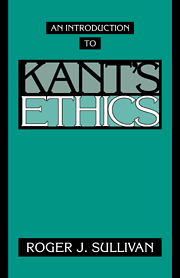Book contents
- Frontmatter
- Contents
- Introduction
- 1 A Beginning: Kant's Political Theory
- 2 The Categorical Imperative: The Ultimate Norm of Morality
- 3 The Formula of Autonomy or of Universal Law
- 4 The Formula of Respect for the Dignity of Persons
- 5 The Formula of Legislation for a Moral Community
- 6 The Limits of the Categorical Imperative
- 7 Morality and Prudence (Foundations 2)
- 8 Moral Character
- 9 Living under the Moral Law
- 10 The Defense of Morality (Foundations 3)
- Suggestions for Further Reading
- Index
9 - Living under the Moral Law
Published online by Cambridge University Press: 05 November 2009
- Frontmatter
- Contents
- Introduction
- 1 A Beginning: Kant's Political Theory
- 2 The Categorical Imperative: The Ultimate Norm of Morality
- 3 The Formula of Autonomy or of Universal Law
- 4 The Formula of Respect for the Dignity of Persons
- 5 The Formula of Legislation for a Moral Community
- 6 The Limits of the Categorical Imperative
- 7 Morality and Prudence (Foundations 2)
- 8 Moral Character
- 9 Living under the Moral Law
- 10 The Defense of Morality (Foundations 3)
- Suggestions for Further Reading
- Index
Summary
We have already encountered many of our moral duties when examining Kant's explication of the Categorical Imperative in the Foundations; others he discussed elsewhere, particularly in his Metaphysics of Morals. In this chapter, we again look at all those that Kant discussed, but in a more organized way. This inventory will not bring anything surprising to light, since he aimed only to reflect what he called “common moral knowledge.” We would not expect every detail of a moral code that is almost two hundred years old to endure without any need for changes, but the very fact that so many of his judgments have survived largely intact is strong presumptive evidence of their fundamental rightness.
We have seen that, according to Kant, we have various kinds of duties. Some are negative; others, positive. Some we have because we are moral agents affected by desires and, therefore, are only contingently obedient to the moral law, and others we have only because we are finite moral–physical beings. We will organize all these duties by asking three questions:
What kind of political system should we have?
What kind of person should each of us aim to become?
What should our personal associations be like?
These questions will help us review our different duties in the same order as in the preceding chapters, beginning with those requirements for living together in a civil community. Following this arrangement should also give us a reasonably coherent view of human life, for all three moral areas share the same foundational practical standard, expressed either as the Principle of Justice or in the various formulas of the Categorical Imperative.
- Type
- Chapter
- Information
- An Introduction to Kant's Ethics , pp. 149 - 159Publisher: Cambridge University PressPrint publication year: 1994



